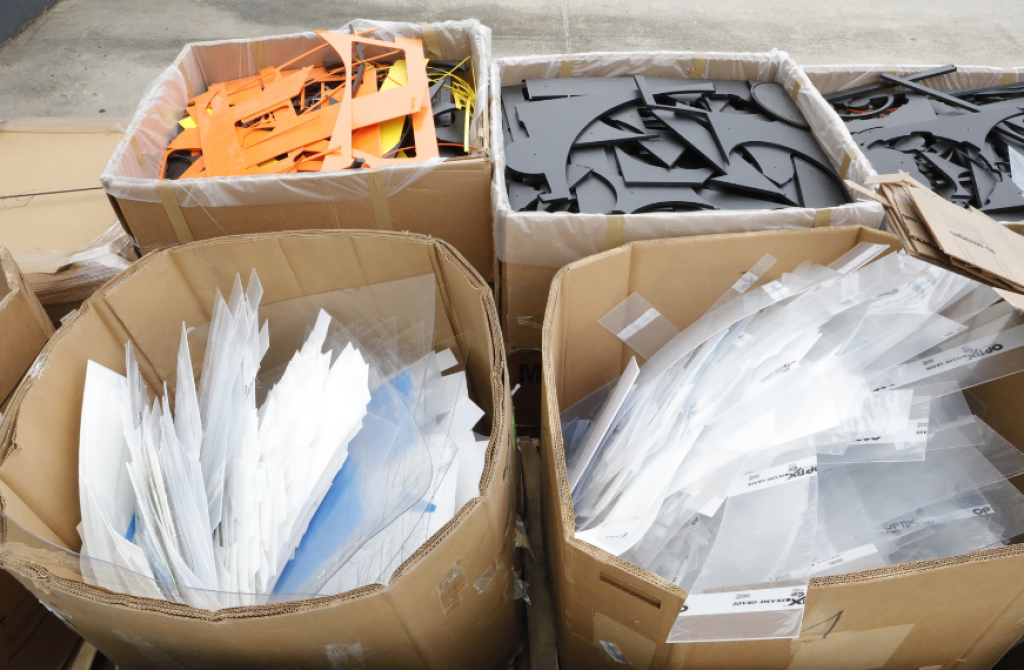At Piedmont Plastics, we are committed to protecting our most valuable resource: our Earth. In line with this mission, Piedmont Plastics is dedicated to supplying performance (non-single use) plastics to help our customers reduce their carbon footprint. Through our sustainability and recycling efforts, we strive to provide recyclable materials and collect plastic scrap by partnering with industries across North America to minimize environmental impact.


An Expert is just around the corner.
With over 100 years of combined product knowledge and industry experience, we are confident our plastics experts can help you find a solution for your application.
Facts About Recycling and Conservation
To celebrate Earth Day 2025, here are five facts that demonstrate how performance plastics and industry organizations are making an impact on recycling and sustainability:
1. Unlike single-use plastics, durable performance plastics are engineered for multi-use applications.
Compared to materials such as glass, steel, or wood, performance plastics often have a lower carbon footprint, according to the International Association of Plastics Distribution (IAPD). They also present distinct opportunities for reducing waste, reusing materials, and enhancing recyclability, such as through scrap waste recycling programs.
Designed for long-term use, performance plastics are utilized in industries such as automotive, aerospace, signage, marine, medical, and construction. Most performance plastics can be repeatedly recycled into new products, such as skylights, displays, signs, and packaging products. Their durability and recyclability make them an ideal choice for reducing waste and promoting sustainable practices.
2. Many types of performance plastics are recyclable.
Plastic polymers in high demand for recycling are ABS, acrylic, polycarbonate, and styrene. Other recyclable plastics include polyolefin, PET, HDPE, PETG, and nylons. In addition to their biodegradability, strong yet lightweight performance plastics require less fuel to transport, resulting in energy and cost savings, fewer safety concerns, and lower maintenance costs over time compared to traditional materials such as metals, wood, and glass, according to IAPD.
In 2018, PET bottles and jars had a recycling rate of 29.1%, while HDPE natural bottles were recycled at a rate of 29.3%, according to the Environmental Protection Agency. By partnering with companies such as Piedmont Plastics to collect plastic scrap, organizations could increase that percentage, helping reduce landfill contributions across North America.
3. As opposed to traditional materials, performance plastics require fewer replacements and repairs over time, leading to cost savings and a lower environmental impact.
Unlike metals and wood, performance plastics are resistant to corrosion, rust, rot, and warping. For this reason, performance plastics are being used as an alternative for wood in the construction and signage industries.
Additionally, plastics can withstand harsh weather conditions without deteriorating, increasing their longevity and performance. Overall, durable performance plastics reduce the need to replace and repair parts, which decreases maintenance costs and extends the lifespan of various applications.
4. Through our recycling program, Piedmont Plastics recovers more than 5 million pounds per year of recyclable scrap materials from our customers.
Customized to our customers’ needs, our recycling program allows us to save scrap material, post-industrial waste, and post-consumer waste from landfills. By recycling materials such as ABS, acrylic, and polycarbonate, our mission is to help our Earth and assist customers with their efforts to go green. In addition to decreasing the hassle of sorting through plastic scrap, we can even collect and recycle scrap waste for further use in other plastic products.
Our recycling program, along with our overall commitment to environmental responsibility, has earned us honors such as the IAPD Environmental Excellence Award. This is just one example of how we demonstrate our dedication to maintaining environmentally responsible practices within our company.
5. Many performance plastics organizations are working to address the need for sustainability.
Plastic production is currently projected to triple by 2060, with annual output potentially exceeding 1.2 billion tons, according to the Plastics Industry Association (PLASTICS). In recognition of the need for sustainable practices, many manufacturers are striving to increase recycling rates, cut emissions from production and transport, and promote circular economies where people reuse plastics rather than throwing them away.
Meanwhile, organizations such as PLASTICS support performance plastic professionals across all industry sectors in their sustainability efforts through advocacy, standards development, and resource sharing. Other organizations like the Association of Postconsumer Plastic Recyclers (APR) play a key role in recognizing companies that collect, reprocess, and sell the by-products of over 90 percent of the post-consumer plastic processing capacity in North America.
Contributing to a Greener World
Overall, organizations are prioritizing the importance of recycling as part of their plastics distribution and environmental advocacy, highlighting the collective desire of the plastics industry to protect our planet above everything else. As the industry makes great strides toward sustainability, Piedmont Plastics is prepared to be at the forefront of this movement.
Today and every day, Piedmont Plastics is committed to helping create a cleaner world through our sustainability efforts. Learn more by visiting our sustainability page, and we wish you a happy Earth Day!
Let's Go Green Together
Learn more about how you can get involved with our custom recycling program by contacting your local branch today!
Get In Touch

